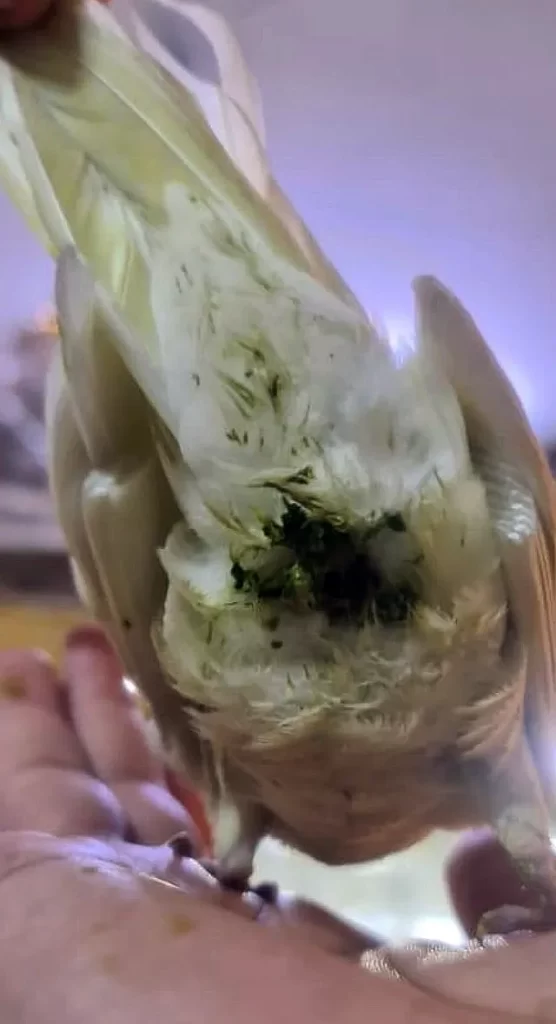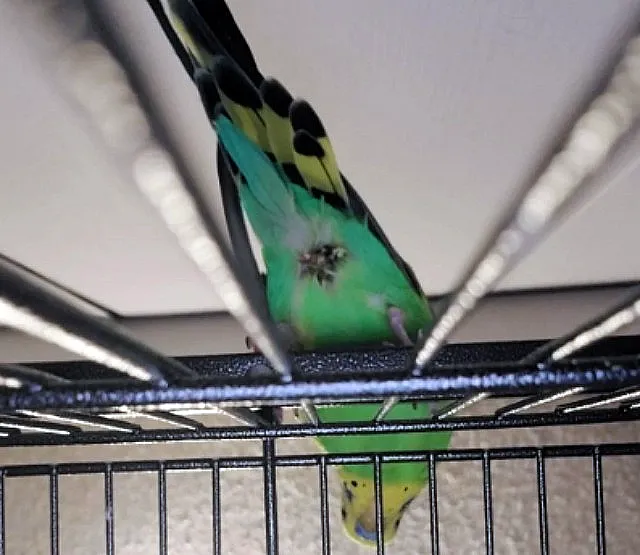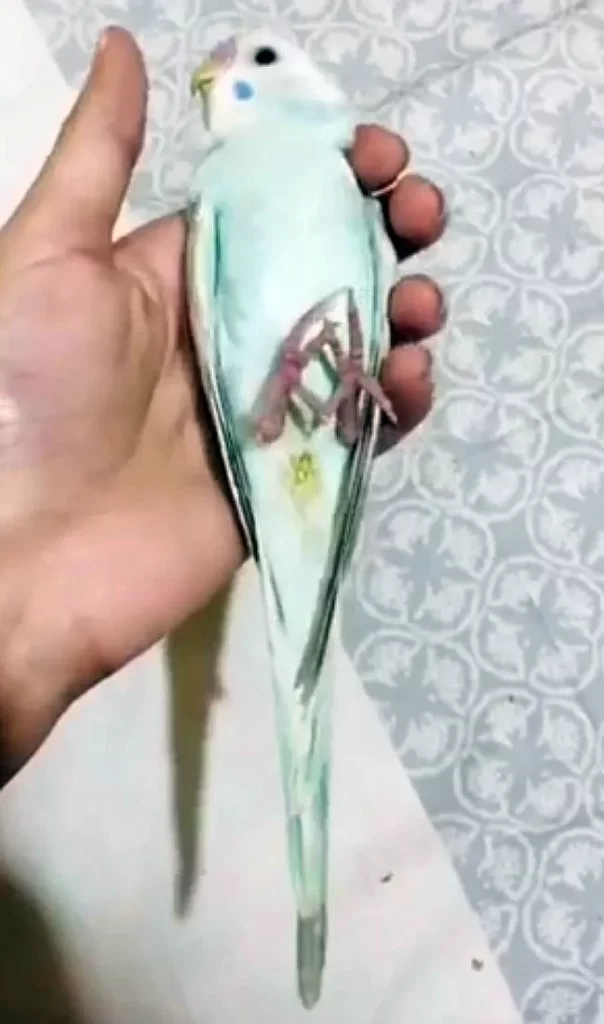Your budgie may have a dirty vent due to reasons like a poor diet, overeating, stress, parasites, or various diseases.
Digestive issues, egg laying complications, old age, frailty, poor hygiene, obesity, and dehydration can also contribute to this problem.
Having spent my days surrounded by birds of all feathers, I’ve come to recognize the various concerns a budgie owner might face.
One such concern is a dirty bum or vent in your feathered friend.
In this article, I’ll share my insights into what might cause this issue.



Complete List Of What Can Cause Dirty Bum Area (Dirty Vent Area) In Budgies
Your lovely budgie may sometimes experience a dirty vent area, also known as a dirty bum, and you might find yourself wondering why.
The reasons can be manifold, and some of them could indicate serious health issues.
It’s essential to identify the cause so you can address the problem effectively and ensure your budgie’s well-being.
Poor Diet
Diet, the fuel for any living being, plays a fundamental role in maintaining a budgie’s health.
Sadly, the significance of a balanced diet for budgies is often underestimated, leading to various health issues, one of which is a dirty bum or vent.
Seed-Based Diets
Seeds, while being a traditional part of a bird’s diet, are not sufficient as a sole dietary source for our feathered pets.
This is due to several reasons tied to their nutritional composition.
Seeds are notably deficient in many essential nutrients, such as calcium, protein, sodium, zinc, manganese, carotene (vitamin A), and vitamin D.
For example, the calcium content in seeds ranges from 200 to 500 parts per million (0.02 to 0.05 percent), whereas a healthy bird’s diet requires close to 1 percent or 10,000 parts per million calcium.
Seeds also present an imbalance of phosphorus to calcium, with sunflower seeds, a favorite among parrots, containing 8 parts phosphorus to every part calcium.
This imbalance can cause severe health problems if seeds are the only source of a bird’s diet.
Furthermore, many seeds are high in fat.
While fat is an essential component of a bird’s diet, overconsumption can lead to obesity.
Birds tend to eat to meet their energy needs, and seeds, being high in energy content, can easily lead to overconsumption before the bird realizes it’s full.
Finally, seeds are deficient in iodine, and a seed-based diet can lead to the development of goiter.
If you choose to include seeds in your bird’s diet, they should be supplemented with a variety of other foods to ensure balanced nutrition.
It’s crucial to remember that a bird can be fed a seed-based diet for years before it begins to look visibly unhealthy.
Usually, by the time a bird shows signs of sickness, it is already in a serious, potentially life-threatening condition.
This is why it’s so important to provide a balanced diet that is not overly reliant on seeds.
A Diet Too High In Fruits Or Vegetables
Budgies, like many other birds, benefit from a diet that incorporates a variety of food sources, including fruits and vegetables.
However, a diet too high in fruits and vegetables can lead to a range of health issues, one of which can be a dirty vent area due to loose stools.
Fruits and vegetables, especially ones high in water content such as cucumbers and watermelons, can make the budgie’s stool loose or watery.
This not only leads to a dirty vent area but can also cause dehydration if not controlled.
Increased water content in these foods can quickly pass through a budgie’s digestive system, leading to more frequent and looser stools.
Moreover, fruits have high sugar content, particularly tropical fruits like mangoes, bananas, and grapes.
While these fruits can provide some necessary nutrients, an excess intake can lead to obesity, diabetes, and other health issues.
Sugary fruits can also change the composition of a budgie’s gut microbiota, which can result in diarrhea and a dirty vent area.
In terms of nutrition, while fruits and vegetables are rich in vitamins and minerals, they do not meet all the nutritional needs of a budgie.
A balanced diet for a budgie also requires proteins, healthy fats, and other essential nutrients found in seeds, pellets, and bird-specific formulated foods.
Nutritional imbalance from an overreliance on fruits and vegetables can lead to health problems that may manifest as a dirty vent area due to poor nutrient absorption and digestion problems.
Overeating
Overeating, although it might seem harmless, can be detrimental to your budgie’s health.
Budgies that eat excessively produce more feces.
More feces can lead to a buildup in the vent area, making it dirty and possibly leading to infections.
Overeating can also result in obesity, another potential cause of a dirty vent area, as we’ll explore later.
Digestive Issues
Digestive issues in budgies can cause abnormalities in their droppings, leading to a dirty vent.
These issues can be caused by a variety of factors, such as bacterial or fungal infections.
Avian gastric yeast, formerly known as megabacteria, or bacterial infections like Salmonella, E.
coli, or Campylobacter can interfere with your bird’s digestion.
These infections can lead to diarrhea or other abnormal droppings, making the vent area dirty.
Egg Laying Or Egg Binding
In female budgies, egg laying can be a cause of a dirty vent.
The process of laying eggs can result in more voluminous or messy droppings, which can lead to a dirty vent area.
Moreover, there’s a condition known as egg binding where a bird is unable to pass an egg.
This is a serious, life-threatening condition that can cause the vent area to become dirty and requires immediate veterinary attention.
Stress
In the complex world of birds, stress can play a major role in their overall health and wellbeing, which extends to their physical cleanliness, including the cleanliness of their bum or vent area.
Just like humans, budgies can experience stress from a variety of factors and this stress can manifest in different ways, sometimes resulting in a dirty vent area.
Stress can result from environmental factors, such as a change in location, exposure to loud noises, introduction to new pets or people, or even a change in their daily routine.
Stress can also be induced by physical factors, such as illness, poor diet, or improper handling.
In the wild, budgies are prey animals, and their instinctive reaction to stress is a “fight or flight” response which can put a lot of strain on their body systems.
One of the primary manifestations of stress in budgies can be seen in their digestive system.
Under stress, budgies can develop digestive issues such as diarrhea, leading to a soiled or dirty vent area.
Additionally, stress can affect a budgie’s appetite, potentially leading to overeating or under-eating, both of which can cause digestive disturbances.
Stress can also weaken a budgie’s immune system, making them more susceptible to illnesses and infections that could lead to a dirty vent area.
This includes bacterial, fungal, or parasitic infections that can directly affect the digestive system, causing symptoms like diarrhea, weight loss, and lethargy.
Illness Or Disease
Various diseases can cause changes in droppings, potentially resulting in a dirty vent.
Diseases such as Psittacosis (parrot fever caused by Chlamydia psittaci) can cause changes in droppings.
Other systemic diseases like liver or kidney disorders can also affect your budgie’s droppings.
Kidney Disorders
Kidney disorders can greatly impact your budgie’s health.
The kidney plays a crucial role in eliminating waste products from the body.
When the kidneys are not functioning properly, this can lead to increased urine content in the droppings, causing the vent area to become wet and, consequently, dirty.
Polyuria
Polyuria, characterized by excessive urination, can also cause wetter droppings and, in turn, a dirty vent area.
This could be indicative of an underlying health issue and should not be ignored.
Parasites
Parasites are another common culprit behind a dirty vent in budgies.
These tiny creatures can cause havoc in your bird’s system, disrupting their digestion and causing loose droppings.
Budgies can be infected by both internal and external parasites.
Internal parasites such as worms or coccidia can interfere with the bird’s digestion, leading to diarrhea or loose droppings that might dirty the vent area.
External parasites like mites or lice can irritate the bird’s skin and possibly cause changes in the droppings, which could lead to a dirty vent area.
Old Age Or Frailty
As budgies grow older, their bodies might not function as efficiently as before.
They might become more frail due to old age or illness, which could affect their ability to preen and clean themselves.
This lack of self-cleaning can lead to a build-up of feces around the vent area, making it dirty.
Providing a gentle assist with cleaning and ensuring their comfort can help manage this issue.
Poor Hygiene Or A Dirty Cage
Maintaining a clean environment for your budgie is crucial for their health and well-being.
If their cage isn’t cleaned regularly, feces can build up and may potentially stick to your budgie’s feathers around the vent area, resulting in a dirty vent.
Poor hygiene can also increase the risk of infections which can further exacerbate the problem.
It’s important to keep the cage clean and ensure good hygiene practices to prevent a dirty vent and protect your budgie’s health.
Obesity
Obesity is a health concern that can have multiple negative impacts on your budgie’s health, including causing a dirty vent.
Overweight budgies might have difficulty reaching their vent area to clean it properly, leading to a build-up of feces.
Additionally, obesity can lead to other health issues that might affect their droppings, indirectly contributing to a dirty vent.
Regular exercise and a balanced diet can help prevent obesity and its associated problems.
Dehydration
Dehydration can cause more concentrated droppings which can be harder to clean for your budgie, resulting in a dirty vent area.
Ensure your budgie always has access to fresh, clean water and monitor its drinking habits.
Changes in drinking habits could be indicative of health issues and should be brought to the attention of a veterinarian.
In conclusion, several factors can cause a dirty vent in your budgie.
However, most can be prevented or managed through proper care, a balanced diet, and good hygiene practices.
It’s essential to keep a close eye on your budgie’s behavior and physical condition.


![What Supplies Do I Need for a Pet Budgie? [Supplies List Inside]](https://www.petiska.com/wp-content/uploads/2022/08/what-supplies-do-i-need-for-a-pet-budgie-supplies-list-inside-1659432551-400x300.jpg)
